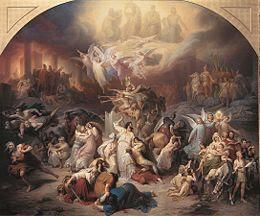
Destruction of Jerusalem, Wilhelm von Kaulbach, 1860
Trevin Wax is author, speaker, blogger and one of the Editors of Lifeway. He is also a student and is busy finishing up his dissertation. He said on his blog recently that he plans to pause his blog in order to make time to finish his dissertation, which was on the topic of Eschatological Discipleship.I was intrigued by this new term, because it seems that the emphasis and giftings the Lord has placed in me is aligned with this kind of discipleship. I mentioned Mr Wax's term "eschatological discipleship" in a recent post. After that, I thought about it more and researched more.
I'm not talking solely about prophecy, though it is the foundation for this kind of discipleship. My goal has always been to quicken the hearts and minds of fellow believers to live increasingly holy lives in fervency and diligence in light of the fact that Jesus is coming again. Discipling people to be reminded of the King to whom we will face at a moment's notice, the rewards that are laid up for us and which we store up ourselves as well, and the fact that the more we look up the better citizens of heaven we will be on earth for His kingdom and our fellow man. It's to tell people, prophecy matters, because we are living it.
As Mr Wax had said in his summary of what eschatological discipling is,
Taking a Break and Asking for Prayer
The topic of my dissertation is “eschatological discipleship.” Following Jesus means understanding our times in light of the biblical vision of history and having the wisdom to make the right choices when the path ahead seems unclear.
Many gospel-centered folks are right to point out that the New Testament’s moral imperatives are often grounded in Christ’s finished work for us in the past. What we sometimes overlook, however, is how many of those moral imperatives also look forward to Christ’s return in the future. We are called to be “children of the day” in a world that knows only darkness.
The question that propels me forward is this:
What kind of discipleship is necessary to fortify the faith of believers so that we understand what time it is, we rightly interpret our cultural moment, and see through the false and damaging views of history and the future that are in our world?
That is the question I posed in my workshop at TGC this year: Discipleship in the Age of Richard Dawkins, Lady Gaga, and Amazon.com: Grounding Believers in the Scriptural Storyline that Counters Rival Eschatologies. (The audio from the talk is available here.) To be alert to our times is a gospel requirement, says Oliver O’Donovan:
To see the marks of our time as the products of our past; to notice the danger civilization poses to itself, not only the danger of barbarian reaction; to attend especially not to those features which strike our contemporaries as controversial, but to those which would have astonished an onlooker from the past but which seem to us too obvious to question. There is another reason, strictly theological. To be alert to the signs of the times is a Gospel requirement, laid upon us as upon Jesus’ first hearers.
Mr Wax also mentioned this topic in an essay at The Gospel Coalition titled 4 Marks of Biblical Discipleship, of which eschatological discipling is one of the marks.
4. Discipleship is Eschatological
Discipleship is eschatological in nature, because the church that makes and receives disciples is eschatological in nature. By eschatology, I’m not referring merely to the “last things” doctrines often relegated to the back of systematic theology textbooks. I’m speaking of eschatology in a broader sense, as encompassing the Christian vision of time and the destiny of our world. Eschatology in this sense informs both our evangelism and our ecclesiology.
I love the picture Lesslie Newbigin paints:
“The church . . . calls men and women to repent of their false loyalty to other powers, to become believers in the one true sovereignty, and so to become corporately a sign, instrument, and foretaste of that sovereignty of the one true and living God over all nature, all nations, and all human lives.”
Seeing discipleship from an eschatological standpoint impacts the way we preach and teach. The alternative is to minimize the eschatological understanding of discipleship, which will leave us with an incomplete worldview, imbalanced discipleship, and eventually, a tragic inability to model the Christian way of life, since modeling implies obedience in a particular time and place.
Discipleship is eschatological, because questions like “What time is it?” and “Where is history going?” greatly impact a disciple’s worldview and inform what modeling a life of following Jesus looks like.There are two aspects to our walk in the faith. One is that we as humans are living in a point in time. We have a birth date and a death date. Our walk with Jesus while in the flesh is finite. Esther was placed in the King's life "for just such a time as this." It was pivotal, her life began and ended and reached a climactic moment we all know occurred in Esther 4:14b.
Many gospel-centered folks are right to point out that the New Testament’s moral imperatives are often grounded in Christ’s finished work for us in the past. What we sometimes overlook, however, is how many of those moral imperatives also look forward to Christ’s return in the future. Trevin Wax.Yet, the other aspect of our existence is not a point in time but a person living in a stream of time in the past, present and future all at once. This mirrors the Lord "who was, who is, and is to come." We were saved, we are being saved, and at a future time the salvation will be completed in glorification. It's like we're standing in a stream, with the current of all of time swirling by our feet. We look left, upstream and we see through our biblical lens the plan of God since Adam and Eve, and our feet are in the same stream of time that they are/were/will be again. Even Esther's climactic moment was only part of a time-stream where if she did not act, "relief and deliverance for the Jews will arise from another place." (Esther 4:14a). The stream flows no matter what we do or what part of it we are standing in.
We look at our feet and see the fish we need to catch and so we are busy performing service to the Lord. Then we look downstream and we see the future. The stream flows but it curves and we cannot quite see what is ahead but we know there are currents and rapids and a waterfall, because we can hear them. We read the Bible and we can see ahead as far as the Lord allows by having given us glimpses from the Bible of where this great rushing stream of water is flowing to.

Wax: "eschatology...as encompassing the Christian vision
of time and the destiny of our world."
What I gather Mr Wax is saying is that when discipling we always focus on the upstream, in looking at the past work of Christ. We also focus on our feet and fish for men and tend the creek where we are standing. However, we rarely tell our discipled members to look downstream at what is ahead. We say to the fisherman acolyte, "You don't need to look ahead, where this great stream of time and plan of God is flowing isn't important for catching fish today, here, now." But it is.
Let me give a practical example of how John MacArthur eschatologically discipled his flock in this way. The Cripplegate summarized Dr MacArthur's message We Will Not Bow, given last week.
Yet the thrust of the message was not condemnation. MacArthur clearly wanted to encourage believers, and so he ended with 2 Thessalonians 1:3-10. In this rich passage, the Thessalonian believers are warmly commended for their “perseverance and faith” in the midst of persecution and afflictions. Apparently this faithful congregation endured many hardships for the cause of Jesus Christ. Paul wants these believers to find relief in the doctrine of the second coming of Christ. Paul tried to comfort the Thessalonians by assuring them that judgment will be merciless to those who reject the mercies of God in Christ.The eschatological portions of scripture are given as a warning to the ungodly (Jude 1:7) and as comfort to the sheep not just in the coming rescue (1 Thessalonians 4:18) but we're exhorted to find comfort in the fact that God will punish the wicked. (2 Peter 2:9).
Therefore we ourselves boast about you in the churches of God for your steadfastness and faith in all your persecutions and in the afflictions that you are enduring. This is evidence of the righteous judgment of God, that you may be considered worthy of the kingdom of God, for which you are also suffering— since indeed God considers it just to repay with affliction those who afflict you, and to grant relief to you who are afflicted as well as to us, when the Lord Jesus is revealed from heaven... (2 Thessalonians 1:4-7a)
The relief spoken of is the coming of Christ in which one of His intentions is to repay and rectify all things. MacArthur finishes by saying:
The key here is at the beginning of verse 7, the middle of verse 7, “when the Lord Jesus will be revealed from heaven.” That’s our focus. It’s ever and always the Christian’s hope. No matter how bad it gets, Jesus is coming.Disciple your folks eschatologically, encouraging the brethren in the full sweep and scope of Christ's plan on the earth and under the earth and in heaven. He was, and He is, and He is to come. He is our hope, He is our relief, He is our rescue, He is our Rock. Drink from that refreshing living stream.
"and all drank the same spiritual drink, for they were drinking from a spiritual rock which followed them; and the rock was Christ. (1 Corinthians 10:4).
